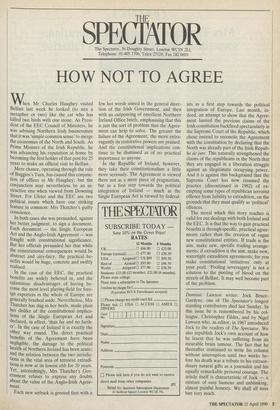SPECTAT THE OR
The Spectator, 56 Doughty Street, London WC1N 2LL Telephone: 01-405 1706; Telex 27124; Fax 242 0603
HOW NOT TO AGREE
Wen Mr Charles Haughey visited Belfast last week he looked (to mix a metaphor or two) like the cat who has killed two birds with one stone. As Presi- dent of the EEC Council of Ministers, he was advising Northern Irish businessmen that it was 'simple common sense' to merge the economies of the North and South. As Prime Minister of the Irish Republic, he was advancing his reputation at home by becoming the first holder of that post for 25 years to make an official visit to Belfast.
Mere chance, operating through the rule of Buggins's Turn, has caused this conjunc- tion of offices in Mr Haughey; but the conjunction may nevertheless be an in- structive one when viewed from Downing Street. For Ulster and the EEC are two political issues which have one striking feature in common: Mrs Thatcher's guilty conscience.
In both cases she was persuaded, against her better judgment, to sign a document. Each document — the Single European Act and the Anglo-Irish Agreement — was fraught with constitutional significance. But her officials persuaded her that while the constitutional consequences would be abstract and airy-fairy, the practical be- nefits would be huge, concrete and swiftly realised.
In the case of the EEC, the practical benefits are widely believed in, and the calamitous disadvantages of having be- come the most level playing-field for fore- ign exporters in the whole of Europe are generally brushed aside. Nevertheless, Mrs Thatcher has dug in her heels, made plain her dislike of the constitutional implica- tions of the Single European Act and declared, in effect, 'thus far and no furth- er'. In the case of Ireland it is exactly the other way round. The direct practical benefits of the Agreement have been negligible; the damage to the political health of Northern Ireland has been acute; and the relation between the two jurisdic- tions in the vital area of terrorist extradi- tions is now at its lowest ebb for 20 years. Yet, astonishingly, Mrs Thatcher's Gov- ernment refuses to express any doubts about the value of the Anglo-Irish Agree- ment.
Each new setback is greeted first with a few hot words aimed in the general direc- tion of the Irish Government, and then with an outpouring of emollient Northern Ireland Office briefs, emphasising that this is just the sort of problem that the Agree- ment can help to solve. The greater the failure of the Agreement, the more extra- vagantly its restorative powers are praised. And the constitutional implications con- tinue to be dismissed as of no practical importance to anyone.
In the Republic of Ireland, however, they take their constitutionalism a little more seriously. The Agreement is viewed there not as a mere piece of pragmatism, but as a first step towards the political integration of Ireland — much as the Single European Act is viewed by federal- ists as a first step towards the political integration of Europe. Last month, in- deed, an attempt to show that the Agree- ment limited the previous claims of the Irish constitution backfired spectacularly in the Supreme Court of the Republic, which chose instead to reconcile the Agreement with the constitution by declaring that the North was already part of the Irish Repub- lic de jure. This naturally strengthened the claims of the republicans in the North that they are engaged in a liberation struggle against an illegitimate occupying power. And it is against this background that the Supreme Court has now resumed the practice (discontinued in 1982) of ex- empting some types of republican terrorist offence from liability to extradition, on the grounds that they must qualify as 'political' offences.
The moral which this story teaches is valid for our dealings with both Ireland and the EEC. It is that the way to gain practical benefits is through specific, practical agree- ments rather than the creation of vague new constitutional entities. If trade is the aim, make new, specific trading arrange- ments; if extradition is the aim, make new, watertight extradition agreements; for you make constitutional 'initiatives' only at your peril. `Pooling sovereignty' is not a solution to the pooling of blood on the streets of Belfast. It may well become part of the problem.


















































 Previous page
Previous page